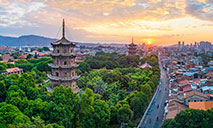China Focus: China moves quickly to contain COVID-19 resurgence

Aerial photo taken on July 27, 2021 shows "Falcon" air-inflated testing labs for COVID-19 nucleic acid testing at a stadium in Nanjing, capital of east China's Jiangsu Province. (Xinhua/Li Bo)
BEIJING, July 31 (Xinhua) -- In the face of new spikes in sporadic COVID-19 infections, governments at various levels across China have promptly taken measures to contain the spread of the coronavirus in an orderly fashion.
This round of infections started in Nanjing, in east China's Jiangsu Province, when nine airport cleaners at the Nanjing Lukou International Airport tested positive during routine testing on July 20.
The mega-city with a population of more than 9.3 million had reported a total of 190 locally transmitted confirmed cases by Friday, according to local authorities.
By Saturday noon, Nanjing had designated 30 areas as medium-risk for COVID-19 and one as high-risk. All tourist sites in the city have been closed since Saturday.
Nanjing authorities also announced a 10-day overall disinfection plan for the Lukou International Airport on Saturday. The city is also drafting a disinfection plan for the residence of airport staff.
In order to enhance its nucleic acid testing capabilities, Nanjing has built six advanced air-inflated testing labs, which can screen up to 1.8 million people every day by using the mixed testing approach.
Three rounds of testing have been conducted citywide. Municipal authorities said Saturday that the city will organize vaccinations for those who are qualified to get the second shot in low-risk areas.
Viral genome sequencing has found all strains to be the highly infectious Delta variant, said Ding Jie, deputy director of the Nanjing municipal center for disease control and prevention, on Friday.
Also in Jiangsu Province, the city of Yangzhou has reported a total of 16 locally-transmitted confirmed COVID-19 cases since Thursday, and the first case was a visitor from Nanjing.
On Saturday, the city suspended all inbound and outbound flights at its Taizhou International Airport, and closed major scenic spots, including the Slender West Lake and the Daming Temple.
Sporadic cases and cluster infections have also been found in other parts of the country, and many of the most recent patients diagnosed have recently traveled to Zhangjiajie, a world-famous tourist destination in central China's Hunan Province.
Zhangjiajie has reported five confirmed locally-transmitted cases since Thursday. The city closed all tourist sites and upgraded 11 neighborhoods to medium-risk areas for COVID-19 on Friday.
All stranded tourists are required to receive nucleic acid testing three times before leaving the city, and all results must be negative.
Emergency channels have been set up for them at all testing sites citywide, and local authorities have coordinated travel agencies and hotels to provide essential services to those tourists before their departure.
The central Chinese city of Zhengzhou, which was recently hit by heavy floods, classified one area as high-risk for COVID-19 and three areas as medium-risk on Saturday, all of them are in Erqi District, after one asymptomatic COVID-19 case and several suspicious cases were reported since Friday. The city is also planning to launch city-wide nucleic acid testing for COVID-19 in a timely manner.
Since Wednesday, the national capital of Beijing has reported two confirmed locally-transmitted cases. They are a couple who recently visited Zhangjiajie.
Nine residential compounds in Changping with about 41,000 residents in total have been put under closed-off management, Tong Lizhi, deputy head of the district government said Thursday.
Beijing has urged unremitting efforts to prevent and control the virus spread during the summer vacation and strengthen the management of inbound and outbound tourists.
A series of measures such as flow restriction, temperature measurement, health-code verification and mask-wearing in parks, scenic spots and traffic stations, will be strictly implemented, the municipal government said Friday.
Zhang Wenhong, a renowned medical expert in China, said that no community cases were found outside of the transmission chain of Nanjing airport, which indicates that the epidemic situation is still under control.
According to Shao Yiming, a researcher with the China Center for Disease Control and Prevention, the spikes in cases are limited to a relatively small scale, especially compared with the situation in other countries and regions of the world.
"Judging from our experience since the second half of last year, we are able to detect the epidemic early and take intensive measures to contain it within a few weeks," said Shao.
Shao said the pressure of imported cases will continue in the future, but China's prevention and control measures have also been strengthened.
"Last year, we only had routine public-health precautions, but vaccines have been available since the beginning of this year. We can now bring this outbreak under control more effectively and faster with a two-pronged approach," he added.
Photos
Related Stories
- Is America’s e-cigarette crisis a smokescreen for the coronavirus outbreak?
- COVID-19 origin tracing: Claim emerges of 'intimidation' from the U.S.
- Central Chinese city closes tourist sites, cinemas after new infections emerge
- Chinese COVID-19 vaccines effective against infection, mortality, say experts
- Third shot of Sinovac COVID-19 vaccine gives big boost to immunity: study
- Is mute Fort Detrick 'innocent'?
- No legal basis, mechanism to hold China liable for COVID-19: Malaysian lawyers
- China's Nanjing reports 13 new locally transmitted confirmed COVID-19 cases
- Philippines receives more Sinovac vaccines from China
- Russian officials, experts say COVID-19 origin tracing should not be politicized
Copyright © 2021 People's Daily Online. All Rights Reserved.










